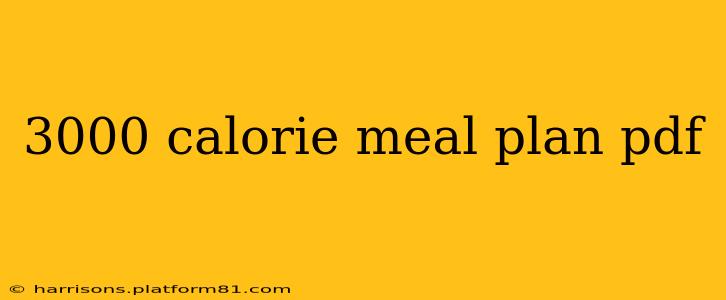A 3000-calorie meal plan isn't a one-size-fits-all solution. Individual caloric needs vary significantly based on factors like age, sex, activity level, metabolism, and body composition. This plan serves as a sample, and you should consult a registered dietitian or nutritionist to personalize a plan tailored to your specific requirements. Remember, a balanced diet rich in whole foods is crucial, regardless of your calorie target. This plan emphasizes whole, unprocessed foods, but flexibility is key – find substitutes that fit your preferences while maintaining nutritional balance. This is not a replacement for professional dietary advice.
Understanding Your Caloric Needs
Before diving into the sample plan, let's address why you might need 3000 calories. High-calorie needs are common among:
- Highly active individuals: Athletes, manual laborers, or individuals with very physically demanding jobs often require significantly more calories to fuel their activities and recover effectively.
- Individuals with high metabolisms: Some people naturally burn more calories at rest than others.
- Individuals with specific health conditions: Certain medical conditions may necessitate a higher caloric intake.
- Those aiming to gain weight (muscle mass): A calorie surplus is essential for muscle growth, but it must be combined with proper resistance training.
It's crucial to consult a professional to determine if a 3000-calorie diet is right for you. An overly high calorie intake, even from healthy foods, can lead to unwanted weight gain and other health issues.
Sample 3000 Calorie Meal Plan
This sample plan is divided into five meals, providing a balanced distribution of macronutrients (carbohydrates, proteins, and fats) throughout the day. Adjust portion sizes to meet your specific needs and preferences.
Breakfast (approx. 700 calories):
- Oatmeal (1 cup dry) with berries (1 cup), nuts (1/4 cup), and seeds (1 tbsp)
- 3 whole eggs scrambled with spinach (1 cup)
- Greek yogurt (1 cup)
Mid-Morning Snack (approx. 300 calories):
- Protein shake (whey or casein protein powder with milk or water)
- Apple with peanut butter (2 tbsp)
Lunch (approx. 800 calories):
- Grilled chicken breast (6 oz) salad with mixed greens (2 cups), avocado (1/2), and olive oil and vinegar dressing.
- Quinoa (1 cup cooked)
- Sweet potato (1 medium)
Afternoon Snack (approx. 400 calories):
- Hard-boiled eggs (2)
- Cottage cheese (1 cup)
- Banana
Dinner (approx. 800 calories):
- Salmon (6 oz) baked with roasted vegetables (broccoli, carrots, peppers, 2 cups)
- Brown rice (1 cup cooked)
Frequently Asked Questions (FAQs)
How many grams of protein should I aim for in a 3000-calorie diet?
Protein requirements vary depending on your activity level and goals. For a 3000-calorie diet, aiming for 150-225 grams of protein per day is a reasonable starting point. However, consulting a professional for personalized guidance is essential.
What are the best sources of healthy fats in a 3000-calorie diet?
Healthy fats are crucial for hormone production and overall health. Include sources like avocados, nuts, seeds, olive oil, fatty fish (salmon, tuna), and nut butters.
Can I lose weight on a 3000-calorie diet?
It’s highly unlikely you'd lose weight on a 3000-calorie diet unless you're extremely active and have a very high caloric expenditure. Weight loss generally requires a calorie deficit.
Are there any potential downsides to a 3000-calorie diet?
A 3000-calorie diet, if not carefully planned, can lead to weight gain, digestive issues, and nutrient imbalances. Consult a dietitian to ensure your diet is properly balanced and addresses your individual needs.
What should I do if I feel hungry on this meal plan?
If you still feel hungry, increase the portion sizes of the meals or add healthy snacks between meals. However, consult a dietitian if hunger persists to ensure you're meeting your nutritional needs. Listen to your body's cues; feeling constantly hungry might signify a need for adjustment.
Conclusion
This 3000-calorie meal plan offers a sample framework. Remember that individual needs vary considerably. Consult a registered dietitian or nutritionist to create a personalized plan that aligns with your specific goals, activity level, and health status. This is crucial for long-term health and well-being. Prioritize whole, unprocessed foods and maintain a balanced approach to nutrition.
